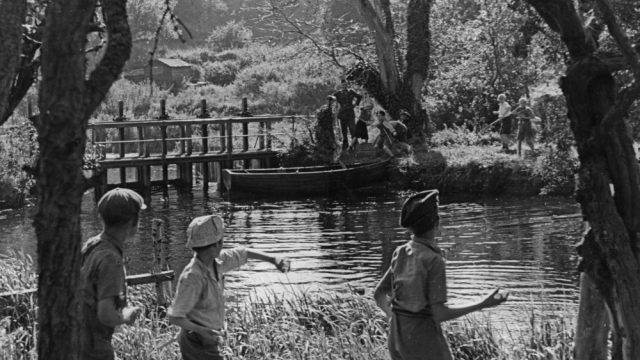A Canterbury Tale is so weird, I can’t believe someone made it. The fact that it has two directors, Michael Powell and Emeric Pressburger, actually makes more sense than if this was one singular vision. Some call it the weirdest movie of the forties and I can’t say I disagree.
The crux of this movie is that several people, two Brits and an American GI, arrive in Canterbury and solve the mystery of someone pouring gum and/or glue in the hair of local women. This results in many characters vowing to catch the “Glue Man”, which is a pretty funny way of putting it. Unlike most mysteries, the stakes are not life or death or even rags to riches, but the inconvenience of getting this sticky stuff out of your hair.
The cast of A Canterbury Tale is pretty good and includes non-actor and real-life Sergeant John Sweet as Sgt. Bob Johnson. I found out Sweet wasn’t a professional actor after I finished the movie and I had no idea. He reminded me of a young Billy Bob Thornton crossed with Colin Hanks, which is weird because that’s like half the cast of Fargo Season 1.
The best part of A Canterbury Tale is a sequence that doesn’t have much to do with the plot, (though I guess it does emphasize the movie’s theme that children are interested in history before puberty hits), where young boys are playing a war game near a river and stop to pick up Bob Johnson, who enlists them to help solve the mystery. The son of the town’s shopkeeper proves especially helpful.
SPOILERS follow:
The funniest part of this dramedy is one of those moments when you realize that people of previous generations weren’t necessarily more prudish than we are today. An American GI is trying to convince his also-American friend to have tea with him. When his friend needs some convincing, the first one says, “It’s a ritual! Like marijuana! You like marijuana, don’t you?” and that convinces him to have some tea. Believe it or not, this also underscores the movie’s themes of importance of rituals and learning a region’s history.
It turns out that the “Glue Man” is the magistrate who wanted to teach young men about the history of Canterbury. He was overjoyed when a military base was built next to him, but dismayed to find the men were more interested in taking out local girls than attending his lectures on Canterbury, so he takes out his anger on the girls these GIs are taking out, so they’ll have to stay in and wash their hair instead of distracting the GIs from the historical significance of the town and specifically a trail that the pilgrims took.
That’s obviously a rather roundabout way to go about accomplishing that goal, but it’s not actually that outlandish when you look at how women are punished because of men’s sex drive all the time. I think the movie knows this, as Alison immediately asks the magistrate if he ever considered just inviting girls to his lectures instead of putting glue in their hair, which he quickly dismisses . I liked how the crimes in A Canterbury Tale literalized the then-often given excuse of a girl staying in to wash her hair. Maybe the young men will be permanently put off by the young women who have to stay in and wash their hair because the young men will interpret the reason the young women can’t go out as a soft rejection. Clever.
A lot of individual shots are beautifully realized with stellar cinematography that uses light playfully, which should probably be credited to Powell, who also made Peeping Tom and The Red Shoes, but A Canterbury Tale’s pacing is a real problem. After the central trio has figured out the whodunnit? portion of the mystery, the magistrate boards the train and tells them his motivation for committing the crimes for seemingly no reason, but to stop them from turning him in. I guess I can’t fault the magistrate sharing his (sort of?) noble motivations with them because they don’t turn him in as they had been planning to, so clearly his plan worked, but I suspect that’s only because this is a work of fiction.
A Canterbury Tale goes on for another ten or twenty minutes after the mystery is solved and the magistrate has revealed his motivations. I believe this is to emphasize that the trio did become more engaged with history because of their involvement with solving the mystery, but it’s rather boring comparatively and, as a viewer, you wonder if the movie knows what its endgame is. Or perhaps that endgame became less compelling because it’s too sympathetic to the magistrate’s perspective, who gets let off the hook for his crimes pretty easily once he confesses only somewhat noble intentions. But those final minutes also gave us that great line about drinking tea because it’s a ritual like marijuana, so I can’t say they were a total waste.

